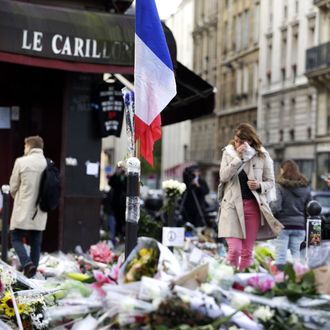
Four days after the attacks in Paris, nearly all of the 129 victims have been identified, and families and friends have begun to mourn and remember those lives lost.
Most of the victims were young; the attacks targeted neighborhoods and venues where finding 20-somethings enjoying their Friday night was a certainty. At La Belle Equipe café, the shooters wiped out nearly an entire group of friends — 11 people — celebrating a birthday. “They were all young and joyful and liked to party on a Friday night,” one friend, who couldn’t attend the party because he was working, told The Wall Street Journal. The word student pops up many times in lists of the dead.
French president François Hollande mourned the fact that so many of those killed were so young. “On Friday it was the whole of France that was targeted. The France that loves life, culture, sport and parties,” he said on Monday. “The assassins wanted to kill the youth of France in all of its diversity. Most of the dead were not yet 30. What was their only crime? It was being alive.”
The dead came from 19 different countries. There was the 23-year-old student from Cal State. Twenty-seven-year-old Michelli Gil Jaimez was from Mexico but had been living in Paris for eight years, according to NBC News. She was going to get married in three weeks.
Three Chileans died while watching the concert at the Bataclan. Other victims included a Moroccan architect, a med-school student from Italy, a Spanish man who once starred in a Spanish TV show about expats, a tour-bus driver from Portugal, and a violinist from Algeria. Mashable has started a Twitter feed that has been going through each of the victims, one tweet at a time, sharing brief glimpses of the lost lives.
Many music lovers were among the dead — 89 of the victims died at the Eagles of Death Metal concert at the Bataclan. Guillaume Barreau-Decherf wrote about music for the magazine Les Inrocks; Universal Music executive Thomas Ayad was also at the concert, as was another Universal employee. Nick Alexander, a British 30-something, was selling merchandise for the rock band playing that night.
According to The Guardian, about 12 victims have yet to be identified.
France had three days of national mourning after the attacks — during that time, makeshift memorials appeared all over the city and museums, and many other public buildings remained closed.
As the victims have been identified — a long and heartbreaking process given the number of deaths — friends and family have also begun to speak. Journalist Antoine Leiris, who lost his wife in the attacks, wrote a post about his wife on Facebook that has been seen more than 90,000 times. “You won’t have my hate,” he said. “On Friday night you took the life of someone exceptional, the love of my life, the mother of my son, but I will not hate you. I do not know who you are and I do not want to know. You are dead inside. If the God for whom you blindly kill really made us in his image, then each bullet in my wife’s body is a wound to his heart.”
Stories of those injured in the attacks — more than 350 in all — or those who witnessed the attacks have also begun to trickle out. One man helped a pregnant woman who was hanging on to the ledge of a window at the Bataclan get back inside — she previously begged those three stories below on the sidewalk to catch her if she fell.
Thomas Tran Dinh told the BBC that he had to “run over dead bodies” to escape; another couple that escaped told ABC News they had to “climb over corpses.”
Plenty of the injured are still in hospitals; the AFP called a third of the injuries “serious” and reported that doctors dealt with “a terrifying number of broken jaws, cracked skulls, gouged-out eyes and smashed limbs.” One surgeon told the AFP, “There was a feeling of great desolation.”





























